Welcome to Sheikh Shakhbout Medical City Nursing Education Centre
At the core of Sheikh Shakhbout Medical City (SSMC), we are dedicated to advancing nursing excellence. Our Nursing Education Centre stands as a premier institution for nurturing and enhancing the skills of our valued nursing professionals.
Our Commitment to Excellence: We strive to elevate the professional practice of our nurses through comprehensive training programmes, workshops and hands-on sessions. Our mission extends beyond training; we are committed to empowering nurses with cutting-edge knowledge and techniques to stay at the forefront of healthcare delivery. This dedication ensures they provide exemplary care and lead in their field, both locally and internationally.
Fostering Interprofessional Collaboration: Healthcare thrives on teamwork. Our centre champions interprofessional collaboration, working closely with esteemed colleagues from various healthcare disciplines. This synergy not only sharpens individual competencies but also strengthens our comprehensive approach to patient care, ensuring superior health outcomes.
A Dedication to Our Community and Beyond: We are committed to the growth of all nursing professionals, from our own staff to the broader nursing community and students. Our initiatives are designed to support local needs while aligning with global healthcare standards, reflecting our commitment to promoting health and education both within and beyond our borders.
Join Us in Our Pursuit of Knowledge and Excellence: We invite all nursing professionals, other healthcare workers, and students to join us on this journey of continuous learning and professional development. Together, we will set new standards of excellence in nursing and healthcare.
For further enquiries and assistance, please contact us on the email below:
-
The Nursing Education at Sheikh Shakhbout Medical City is proud to offer the Nurse Fellowship Programme, a distinguished initiative accredited by the American Nurses Credentialing Centre’s Practice Transition Accreditation Programme (ANCC PTAP). This esteemed accreditation marks our programme as the first and only of its kind, setting a benchmark for nursing excellence at SSMC.
Programme Overview:
Designed to seamlessly integrate new staff nurses into the Sheikh Shakhbout Medical City (SSMC) family, our Nurse Fellowship Programme spans a total of nine months. This comprehensive programme begins with a three-month probationary period, followed by a six-month transition-to-practice phase. This structure ensures a smooth and thorough integration into our unique healthcare environment, equipping our nurses with the skills and confidence needed to excel in their roles.
Key Objectives of the Nurse Fellowship Programme:
- Multidisciplinary Team Integration: Participants will develop essential skills to effectively function within nursing and interdisciplinary teams. This includes enhanced communication, conflict resolution and critical thinking capabilities.
- Patient-Centred Care: Our fellows commit to delivering the highest standards of patient and family education, ensuring patient-centred care at every level.
- Evidence-Based Practice: Fellows will consistently apply evidence-based principles across all aspects of their practice, ensuring the highest quality of care.
- Safety Culture: By adopting quality improvement methodologies, our fellows will promote a culture of safety, making critical assessments and appropriate referrals to support entities such as palliative care.
- SSMC Cultural Integration: The programme fosters deep integration into SSMC’s diverse cultural environment, focusing on principles of violence and escalation management and recognising the needs of secondary victims.
Programme Structure:
Our programme emphasises Impactful Learning, where knowledge is explained, expanded, engaged and embedded to ensure its practical application. The hybrid format combines online materials with active engagement in face-to-face meetings, enriching the fellows’ learning experience.
Certification:
- 29.5 ANCC CNE accredited hours
- 5 Lippincott CE hours
Join our Nurse Fellowship Programme at SSMC and embark on a journey of professional growth and excellence. For more information or to apply, please contact us at [email protected]
-
Welcome to the Nursing Observership Programme at Sheikh Shakhbout Medical City (SSMC). This programme is thoughtfully designed as a gateway for nursing students and early-career nurses to observe and learn within a real-world healthcare setting, providing a valuable perspective beyond traditional academic environments.
Programme Highlights:
-
Real-World Observations: Engage in a unique observational experience that allows you to witness the day-to-day responsibilities and advanced practices of professional nursing within a leading medical facility.
-
Learn from the Best: Benefit from the guidance of our highly skilled nursing team, who will serve as mentors throughout your observership. Their extensive experience and dedication to excellence provide an unparalleled learning opportunity.
-
Diverse Nursing Community: Immerse yourself in a dynamic environment alongside a diverse community of nurses from 31 distinct nationalities. This exposure to a variety of perspectives and practices enhances your understanding and appreciation of global nursing standards.
-
Accredited Educational Opportunities: Our programme is recognised and accredited by both the Department of Health – Abu Dhabi (DOH) and the American Nursing Credentialing Centre (ANCC), ensuring that your observership is acknowledged as a credible and valuable educational experience.
Qualifications for Enrolment:
- Currently enrolled in an accredited bachelor’s programme in nursing.
- Completion of at least two semesters of clinical nursing experience, typically achieved by the end of the junior year in the baccalaureate nursing programme.
- BLS Certification.
If you are considering an opportunity to bridge academic learning with practical observation and are ready to expand your horizons in alignment with industry standards, apply now to be a part of our esteemed Nursing Observership Programme.
For further queries or details regarding the programme, please Contact Us. We’re excited to have you embark on this transformative journey with SSMC!
-
-
Welcome to the Nursing Student Clinical Placement Programme at Sheikh Shakhbout Medical City (SSMC). This programme is meticulously designed to align with the academic requirements of nursing students, providing an immersive and practical experience in a real-world clinical setting.
Programme Highlights:
-
Application of Theoretical Foundations: Students will integrate their academic knowledge with practical skills, adhering to the Scope of Practice Framework. This balance ensures that theoretical learning is effectively applied to real clinical scenarios, enhancing healthcare outcomes.
-
Sharpening Analytical Capabilities: A key focus of our programme is to develop students’ analytical skills, enabling them to assess various clinical situations accurately and make informed decisions. This empowerment supports proficient problem-solving and decision-making in clinical practice.
Goals of the Programme:
- To provide a structured and supportive environment where students can apply their theoretical knowledge in real clinical settings.
- To enhance students’ competencies in handling practical healthcare scenarios, ensuring they are well-prepared for their future roles as nursing professionals.
Eligibility Criteria:
- The programme is designed for students actively seeking placements as an essential component of their academic curriculum.
- Entry into the programme requires a formal agreement to ensure a seamless and enriching experience.
Are you ready to transform your theoretical insights into practical clinical outcomes? Join the Nursing Student Clinical Placement Programme at SSMC.
For more details, enquiries, or clarifications, please Contact Us. We at SSMC are fervently dedicated to shaping the future of nursing!
-
-
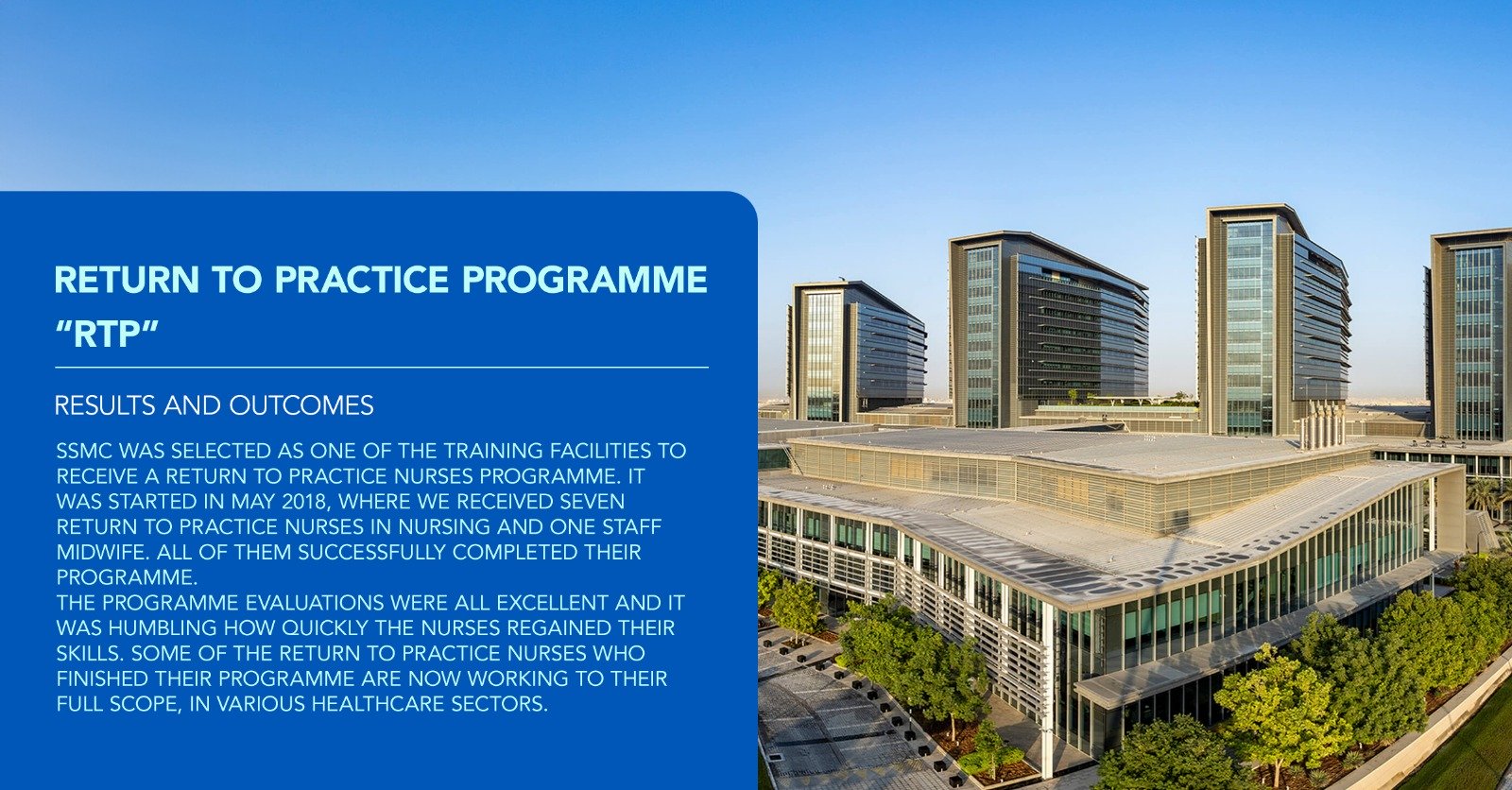
Welcome to the Return-to-Practice (RTP) Programme at Sheikh Shakhbout Medical City. Designed to re-engage nurses who have taken a break from their clinical careers, our RTP programme offers a robust pathway back into professional practice. This programme highlights the valuable contributions of experienced nurses and supports their transition back into the healthcare workforce.
Programme Overview
-
Tailored Approach: The duration of the programme varies based on the length of the practice gap and subsequent performance assessments, with a minimum commitment of four months and up to twelve months of focused study and training.
-
Empirical Support: Studies highlight the effectiveness of RTP programmes in re-integrating experienced nurses into healthcare settings, noting significant benefits in retention rates and cost-effectiveness compared to training new pre-registration nurses.
Eligibility Criteria:
-
Inactive License: Suitable for nurses whose licenses have become inactive.
-
Extended Break: Aimed at professionals who have not been practicing nursing for at least two years.
Application Process:
-
Regulatory Approval: Begin your journey by seeking approval from the Department of Health, ensuring compliance with all regulatory standards.
-
Online Application: Following approval, apply online through the SSMC website to officially enrol in the RTP programme.
-
Interview: Applicants will undergo an in-depth interview with the RTP Programme coordinator to discuss suitability and expectations.
Why Join the RTP Programme?
- Reinvigorate your nursing career and reconnect with your passion for healthcare.
- Contribute to healthcare excellence with updated skills and knowledge.
- Benefit from a structured re-entry pathway that respects your previous experience and values your professional maturity.
For additional insights, clarifications or assistance with the application process, please Contact Us. Reignite your nursing passion and contribute to healthcare excellence with SSMC’s RTP Programme!
-
-
“Educate, Train, and Retain: Empowering Nursing Workforce towards Excellence”
In July 2022, the SSMC Nursing Education Department (NEC) proudly initiated its grand round/webinar series. This initiative embodies our commitment to foster evidence-based practice and continuous learning.
Purpose:
- Promotion of Evidence-Based Practice: Elevate the standard of care through the integration of the latest evidence in daily nursing practices.
- Reflective Learning: Offer a platform for nurses to reflect on their practices, thereby enhancing the quality of care, through the mutual exchange of experiences and knowledge.
What We Offer:
- Expert Knowledge Sharing: Renowned national and international speakers come together to share insights into the latest advancements, innovations, and best practices in nursing.
- Diverse Topics Covered: Sessions delve
into a range of topics including:
- Clinical simulation
- Research and evidence-based practice
- Transformational leadership
- Ethical considerations in nursing
- Risk management
- Quality improvement strategies
- Wider Audience Reach: The series has welcomed attendees not only from SSMC but also from hospitals across the UAE and neighbouring countries.
- Accreditation: Sessions are accredited either as DOH Cat I or ANCC by SEHA Abu Dhabi Health Services Corporate.
- Impressive Numbers: Over the last year, we’ve successfully held approximately 18 series and have issued more than 1000 certificates.
For any further questions or assistance, please reach out to our support team. Join us in our quest to elevate the standards of nursing care and practice through shared knowledge and innovation!
-
Sheikh Shakhbout Medical City proudly announces the 3rd edition of our annual Education Week – Nursing Education Centre Day, set for October 15, 2024. Initiated in 2022, this event has swiftly become a cornerstone in our commitment to fostering educational excellence and professional development in the healthcare sector.
Event Details:
Date: October 15, 2024
Location: Sheikh Shakhbout Medical City Annex Building 3rd Floor Auditorium
Who Should Attend:
- Nurses and Nurse Leaders
- Student Nurses
- Allied Health Professionals
- Healthcare Educators
- Healthcare Administrators
- Anyone passionate about healthcare innovation and education
About the Event:
Education Week at Sheikh Shakhbout Medical City is a vibrant gathering that brings together professionals from across the healthcare spectrum. This week-long celebration culminates in the Nursing Education Centre Day, a flagship event dedicated to showcasing the latest advancements and current practices in nursing and healthcare education. Nursing Education Centre Day is an exceptional opportunity to explore the dynamic landscape of healthcare through a series of engaging activities. Attendees will have the chance to participate in:
- Inspirational Talks: Featuring industry leaders and pioneers who will discuss innovative practices, emerging trends and the future of healthcare delivery.
- Interactive Workshops: These sessions are crafted to provide hands-on experience in the latest healthcare techniques, from clinical skills to advanced technology applications.
- Expert Panels: Delve into discussions about the challenges and solutions in modern healthcare with experts from various specialities.
- Research Presentations: Discover cutting-edge research from nursing and allied health professionals that are shaping the future of healthcare practices.
- Educational Exhibitions: Explore exhibits showcasing the latest medical and educational technologies, services and literature.
Nursing Education Centre Day specifically aims to highlight the current practices that are transforming nursing and healthcare delivery. It offers a platform for professionals to share their expertise, learn from one another, and witness firsthand the innovations that are driving professional growth and improving patient outcomes.
Why Participate:
- Professional Development: Engage with a wealth of knowledge and experiences that can significantly enhance your skills and career trajectory.
- Networking Opportunities: Meet and connect with fellow healthcare professionals, industry leaders and educators from around the region and beyond.
- Earn CME Credits: Take advantage of the opportunity to earn Continuing Medical Education credits through various accredited sessions.
- Innovation in Practice: Get insights into how innovative practices and technologies are being integrated into healthcare education and delivery.
This event is designed not only to educate but also to inspire and empower healthcare professionals to push the boundaries of what is possible in their fields. Join us for an enlightening day that promises to expand your perspectives, introduce you to new ideas and provide you with tools to enhance your professional practice.
Mark your calendars for October 15, 2024, and be part of this transformative experience. For more information on how to register or details about the schedule of events, please visit our website or contact the Nursing Education Centre directly.
-
Welcome to the Life Support Training Centre at Sheikh Shakhbout Medical City, a premier facility dedicated to providing essential life-saving skills and certifications. Our centre offers a range of courses designed for healthcare providers, emergency responders, and professionals in various fields requiring expertise in emergency care and life support techniques.
Life Support Training Courses
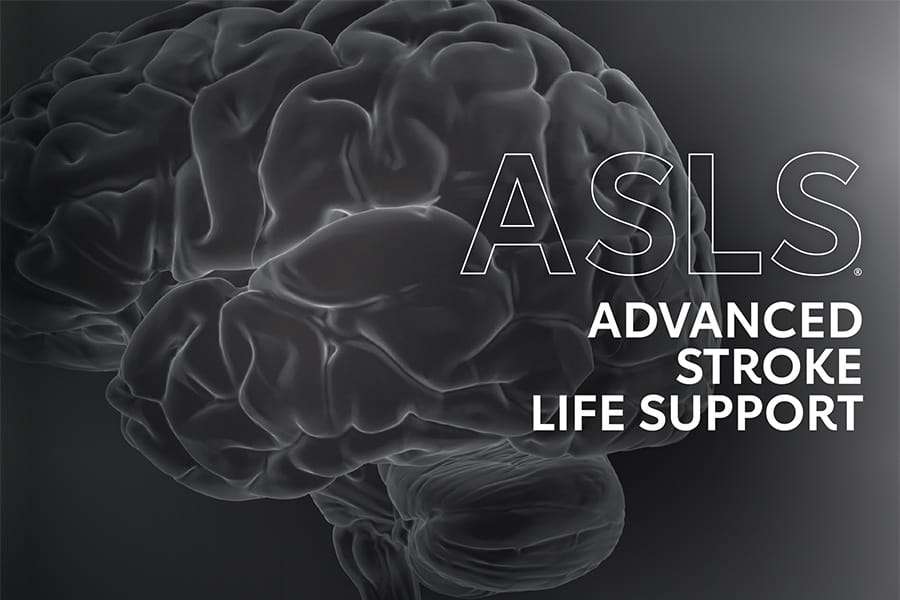
Advanced Stroke Life Support (ASLS) Certification
Designed for healthcare professionals involved in stroke care, this course offers essential training in the early recognition and management of stroke patients. Through interactive lectures, practical skills stations, and evidence-based guidelines, participants will enhance their ability to provide effective stroke care in hospital settings.
Register here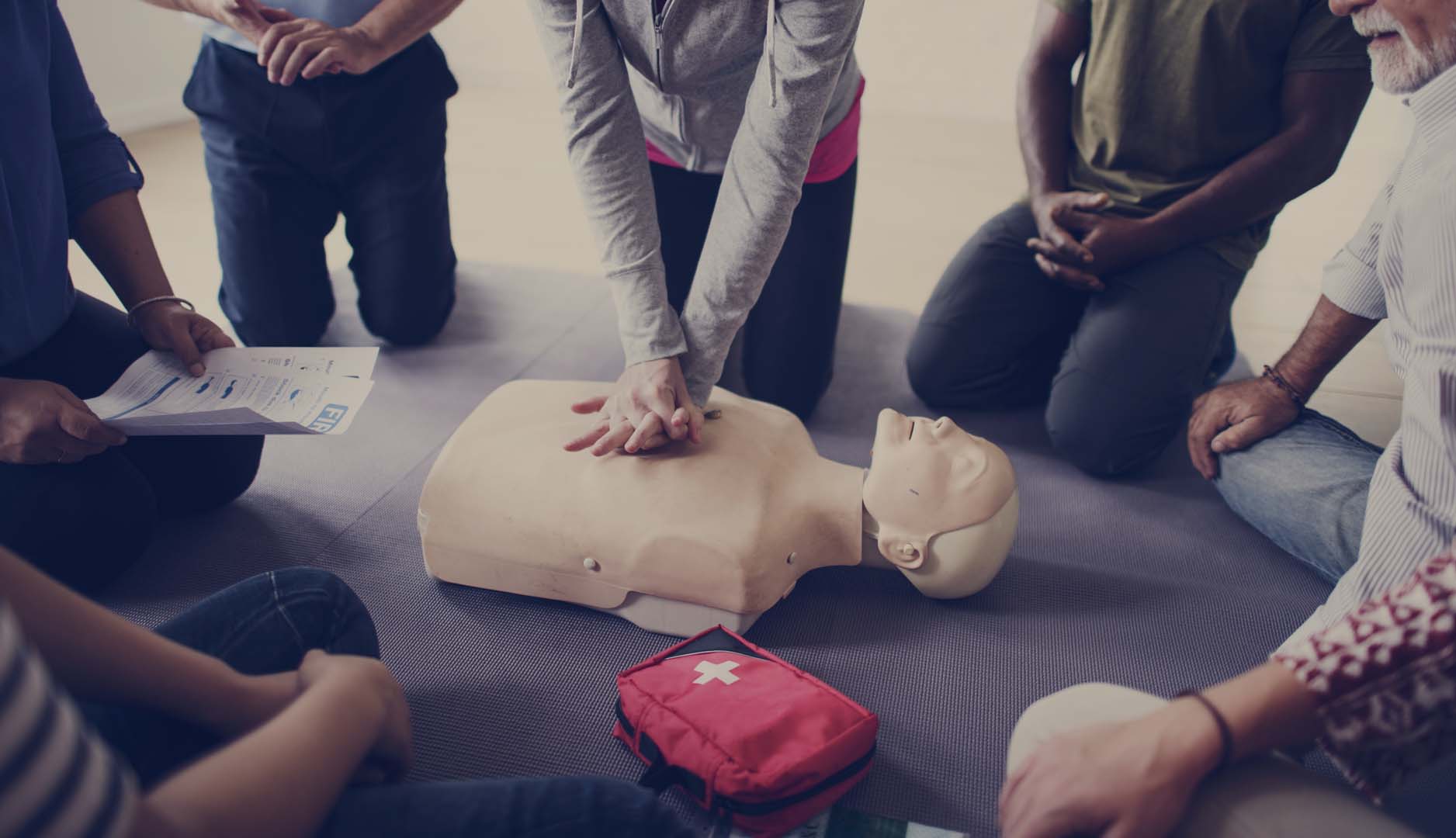
Basic Life Support (BLS) Certification/Recertification
Ideal for healthcare providers and emergency responders, our BLS course covers fundamental life-saving techniques essential in critical moments. Participants will learn CPR, how to use an Automated External Defibrillator (AED), and other basic emergency response skills necessary to sustain life until further medical care is available.
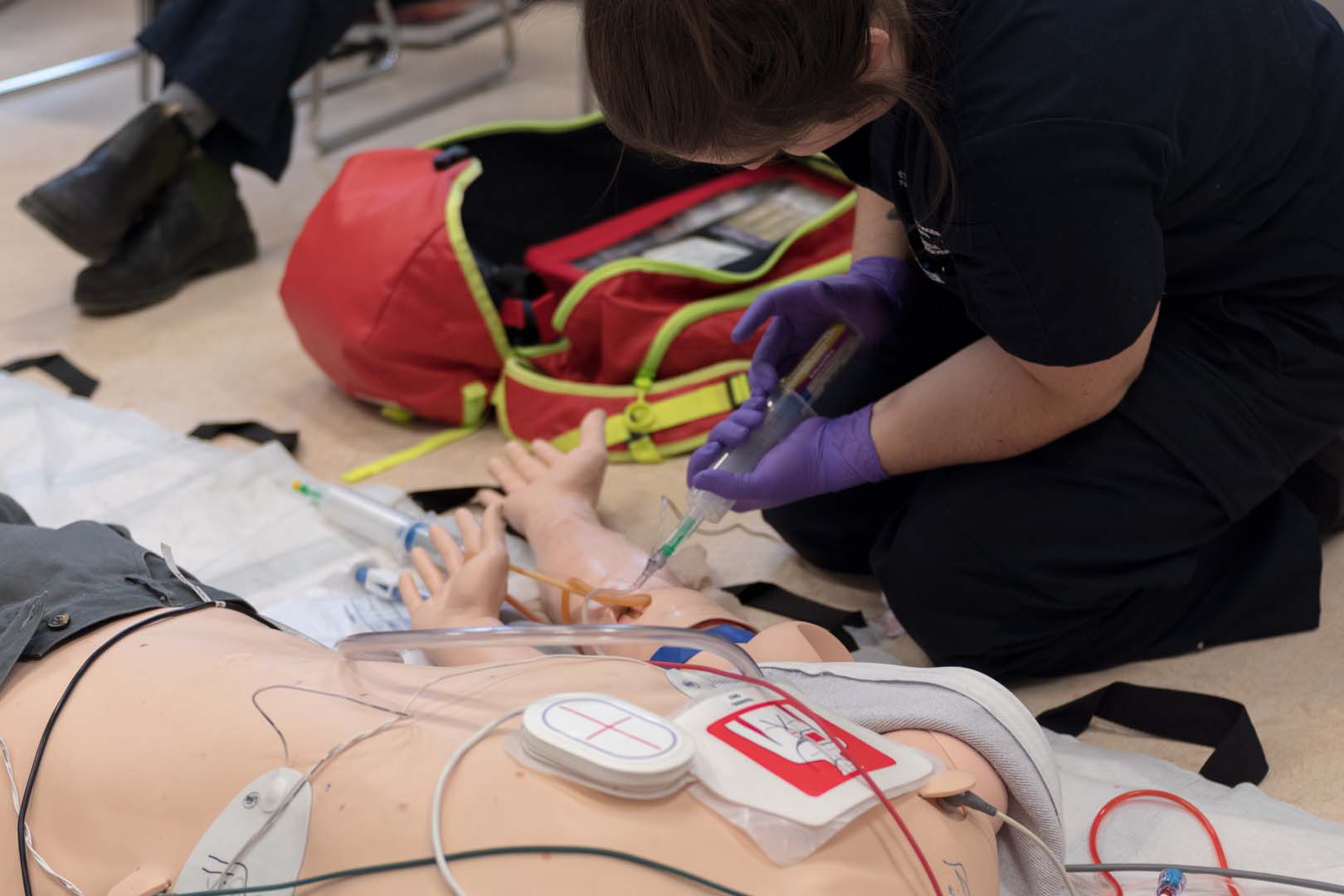
Advanced Cardiac Life Support (ACLS) Certification/Recertification
This course is designed for healthcare professionals who respond to cardiovascular emergencies. The ACLS course delves into advanced interventions, comprehensive cardiovascular life support, emergency pharmacology, and effective team communication during emergencies.
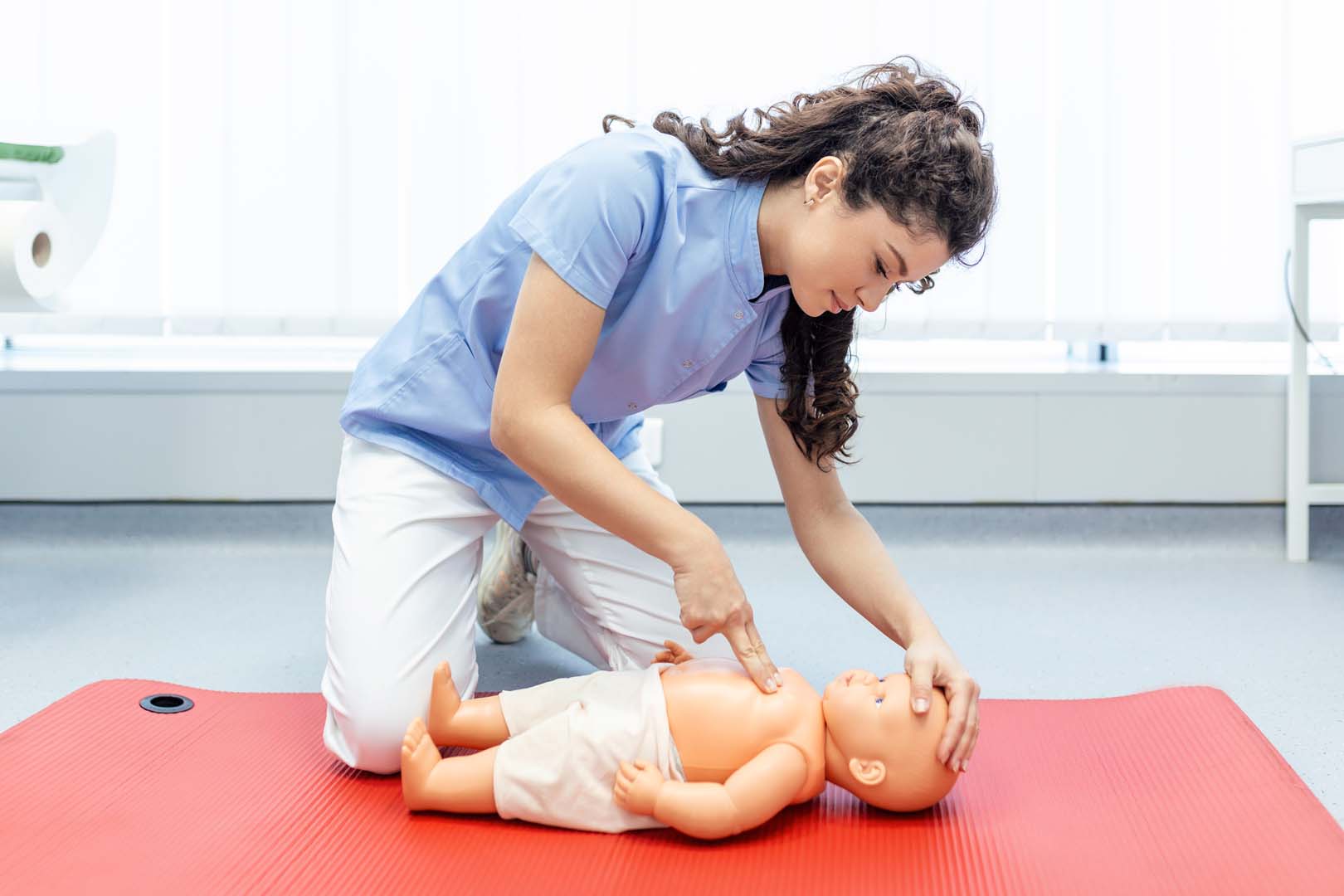
Paediatric Advanced Life Support (PALS) Certification
Specifically tailored for professionals caring for neonates and children in critical conditions, PALS certification focuses on managing and preventing respiratory emergencies, shock and arrhythmias in paediatric patients. The course emphasises the importance of a systematic approach to paediatric assessment and effective resuscitation techniques.
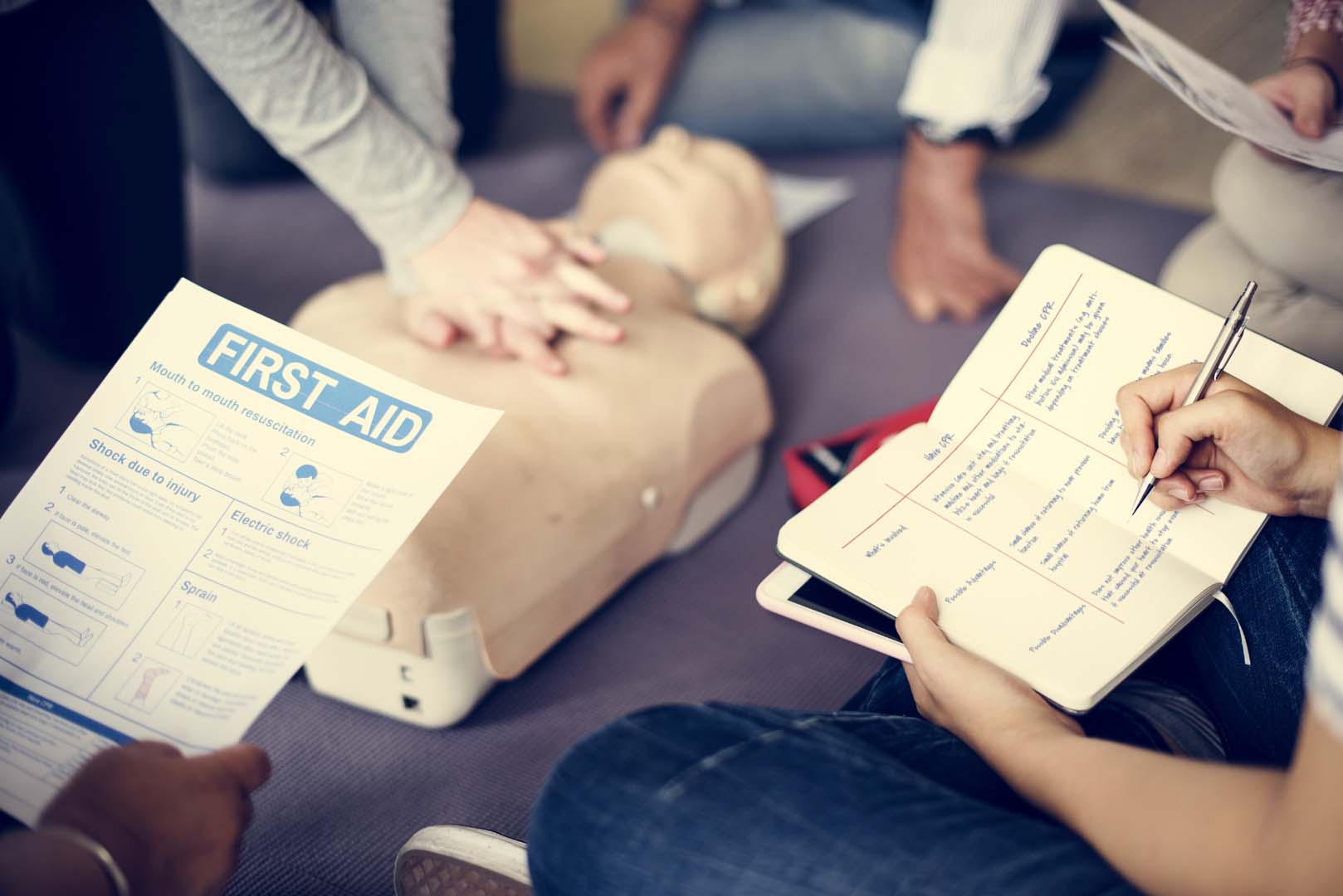
Heart Saver-First Aid CPR-AED Certification
This certification is suitable for anyone, including the layperson or non-healthcare professional, who wishes to learn essential first aid and CPR skills, along with AED operation. The course is designed to prepare participants to provide first aid, CPR, and use an AED in a safe, timely and effective manner.
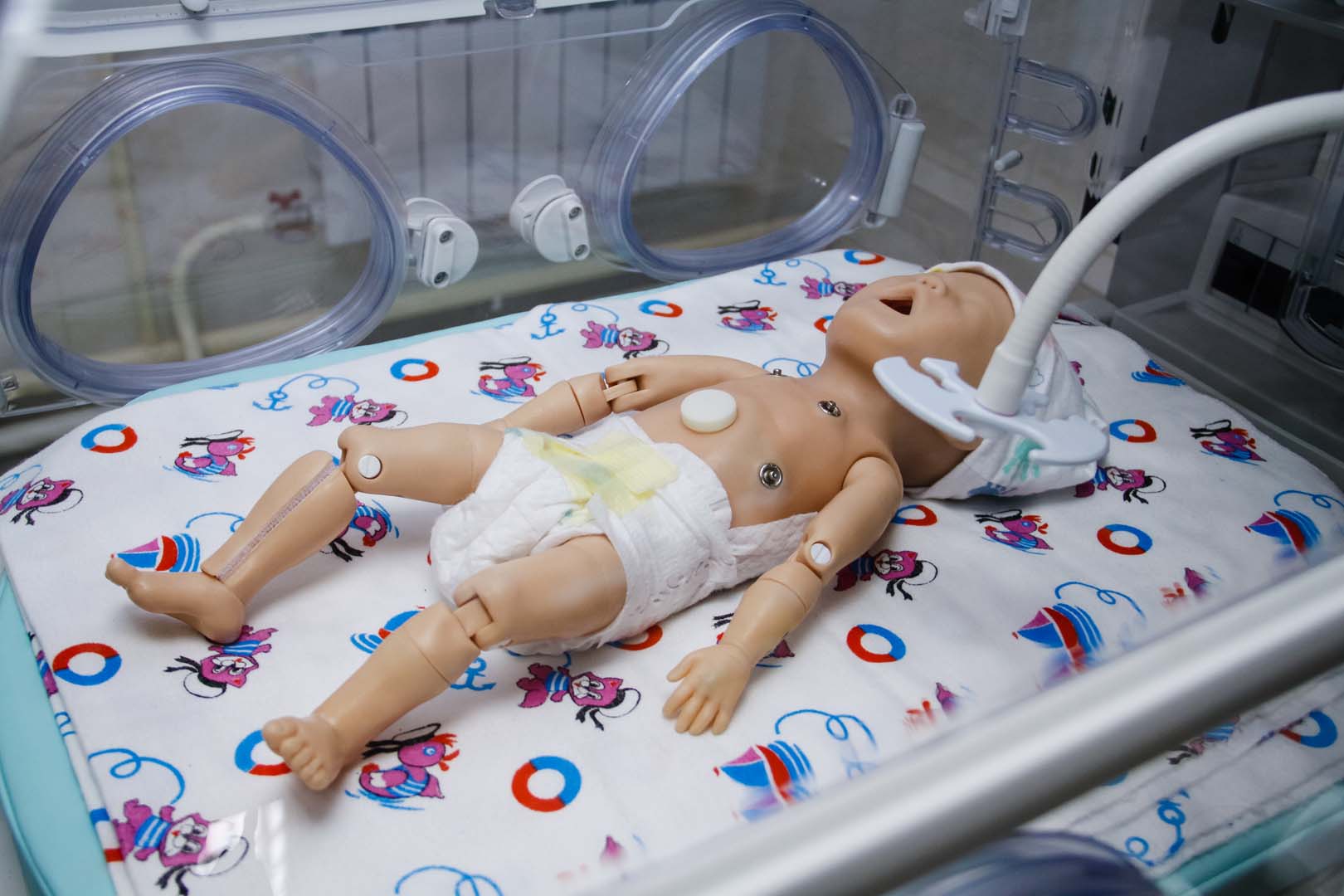
Neonatal Resuscitation Program (NRP) Certification/Recertification
Our NRP course is vital for healthcare providers involved in the direct care of newborns at the time of delivery. This programme equips participants with the skills and knowledge needed to effectively perform neonatal resuscitation using a clear and systematic approach based on the latest guidelines.
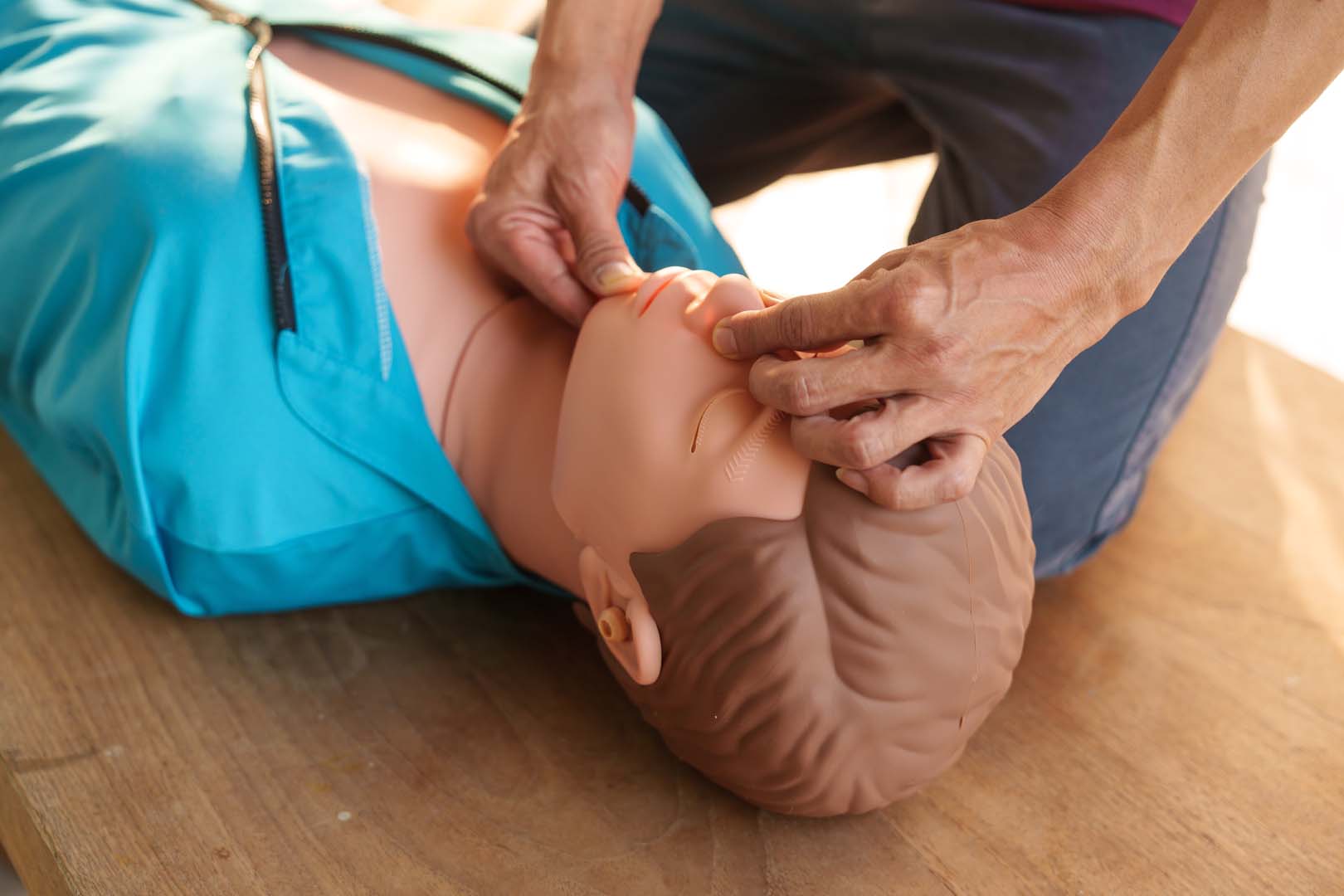
Instructor Courses (BLS/ACLS/PALS)
For those looking to take their professional skills to the next level, we offer instructor certification courses in BLS, ACLS, and PALS. These courses prepare participants to become instructors in these fields, empowering them to teach and certify others in life-saving techniques.
Why Choose Our Life Support Training Centre?
-
Accreditation: Our courses are accredited by leading health organisations, ensuring that your certification is recognised both nationally and internationally.
-
Expert Instructors: Learn from experienced professionals who bring real-world expertise to the classroom.
-
State-of-the-Art Facilities: Train in our fully equipped facility designed to simulate real-life emergencies, providing an immersive learning experience.
-
Flexible Scheduling: We offer courses at various times to accommodate the busy schedules of professionals.
Join us at the Life Support Training Centre to enhance your skills, certify your ability to save lives, and advance your professional career. For more information on course schedules, registration, and pricing, please Contact Us.
-
-
The Trauma Nursing Core Course (TNCC) stands as evidence for excellence in trauma nursing training globally. Designed for nurses, hospitals, and trauma centres, it provides the indispensable knowledge, analytical thinking abilities, and hands-on practice required to ensure the safety and well-being of trauma patients.
Introduction:
Crafted by the Emergency Nurses Association, the TNCC is a comprehensive one and a half day course. It serves to instil a robust foundation in trauma nursing, equipping nurses with both cognitive insights and psychomotor proficiencies integral to the delivery of unrivalled care to trauma patients. TNCC’s primary objective revolves around enhancing trauma patient outcomes.
This is achieved by offering nurses a systematic Trauma Nursing Process to direct patient care, underpinned by solid trauma knowledge and skills.
Verification of successful course culmination hinges on clearing the written examination and excelling in the Trauma Nursing Process (TNP) psychomotor skills section. Once verified, the validation stands for a commendable four years.
Inclusions:
- Access to online modules.
- Comprehensive one and a half day in-person training.
- The latest edition of the TNCC book.
- Snacks and lunch for participants.
- 4-year certification, subject to successful course completion and fulfilling all stipulated requirements.
Eligibility Criteria:
- Must be a registered nurse.
- Non-nursing attendees are heartily welcomed. However, please note that they won’t be eligible for the 4-year certification. They will instead receive CNE hours.
Course Fee:
- AED 1650 + 5% VAT
Confirmed Course Dates:
- May 29 & 30
- 24-25-Jul-2024
- 18-19-Sept-2024
- 29-30-Oct-2024
- 24-25-Dec-2024
External Participant Availability:
- Limited to 6 slots per session.
For any further enquiries or to reserve a slot, kindly Contact Us. Elevate your trauma nursing acumen and proficiency with the globally recognised TNCC course!



